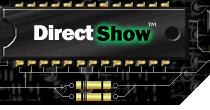



Index
Topic Contents
Previous Topic: IQueueCommand Interface
Next Topic: IRegFilterInfo Interface
 |
 | 
|

|
| |||
| |||
IReferenceClock Interface
The IReferenceClock interface represents a system reference clock to be implemented by a filter in the filter graph and used by other filters.
When to Implement
Implement this interface if you are writing a filter that generates a system reference clock. Typically, this applies to audio renderer filters because audio sound boards usually contain a reference clock. Use the CBaseReferenceClock class to implement this interface.
When to Use
Use this interface on any filter to obtain reference clock notifications for a duration of elapsed time (both singular and repetitive), or to retrieve the current time.
Methods in Vtable Order
IUnknown methods Description QueryInterface Returns pointers to supported interfaces. AddRef Increments the reference count. Release Decrements the reference count.
IReferenceClock methods Description GetTime Gets the current time. AdviseTime Requests an asynchronous notification that a duration has elapsed. AdvisePeriodic Requests an asynchronous, periodic notification that a duration has elapsed. Unadvise Cancels a request for notification. IReferenceClock Interface
IReferenceClock::AdvisePeriodicRequests an asynchronous, periodic notification that a duration has elapsed.
HRESULT AdvisePeriodic(
REFERENCE_TIME rtStartTime,
REFERENCE_TIME rtPeriodTime,
HSEMAPHORE hSemaphore,
DWORD * pdwAdviseCookie
);Parameters
- rtStartTime
- [in] Time the notification should begin.
- rtPeriodTime
- [in] Duration between notifications.
- hSemaphore
- [in] Handle of a semaphore through which to advise.
- pdwAdviseCookie
- [out] Used to identify this call to AdvisePeriodic in the future; for example, to cancel it.
Return Values
Returns an HRESULT value that depends on the implementation. HRESULT can be one of the following standard constants, or other values not listed:
Value Meaning E_FAIL Failure. E_POINTER Null pointer argument. E_INVALIDARG Invalid argument. E_NOTIMPL Method isn't supported. S_OK or NOERROR Success. Remarks
When the time indicated by rtStartTime is reached, the semaphore whose handle is set as hSemaphore will be released. Thereafter, the semaphore will be released repetitively with a period of rtPeriodTime.
See Also
IReferenceClock::Unadvise, CBaseReferenceClock::AdvisePeriodic
IReferenceClock Interface
IReferenceClock::AdviseTimeRequests an asynchronous notification that a duration has elapsed.
HRESULT AdviseTime(
REFERENCE_TIME rtBaseTime,
REFERENCE_TIME rtStreamTime,
HEVENT hEvent,
DWORD * pdwAdviseCookie
);Parameters
- rtBaseTime
- [in] Base reference time.
- rtStreamTime
- [in] Stream offset time.
- hEvent
- [in] Handle of an event through which to advise.
- pdwAdviseCookie
- [out] Destination of the token.
Return Values
Returns an HRESULT value that depends on the implementation. HRESULT can be one of the following standard constants, or other values not listed:
Value Meaning E_FAIL Failure. E_POINTER Null pointer argument. E_INVALIDARG Invalid argument. E_NOTIMPL Method isn't supported. S_OK or NOERROR Success. Remarks
When the time rtBaseTime+rtStreamTime is reached, the event whose handle is hEvent will be set. If the time has already passed, the event will be set immediately.
See Also
IReferenceClock Interface
IReferenceClock::GetTimeRetrieves the current time. REFERENCE_TIME is a LONGLONG type and loosely represents the number of 100-nanosecond units that have elapsed since some fixed start time. See Characteristics of a Reference Clock for other requirements on the reference clock.
HRESULT GetTime(
REFERENCE_TIME * pTime
);Parameters
- pTime
- [out] Current time.
Return Values
Returns an HRESULT value that depends on the implementation. HRESULT can be one of the following standard constants, or other values not listed:
Value Meaning E_FAIL Failure. E_POINTER Null pointer argument. E_INVALIDARG Invalid argument. E_NOTIMPL Method isn't supported. S_OK or NOERROR Success. IReferenceClock Interface
IReferenceClock::UnadviseCancels a request for notification.
HRESULT Unadvise(
DWORD dwAdviseCookie
);Parameters
- dwAdviseCookie
- [in] Request to cancel.
Return Values
Returns an HRESULT value that depends on the implementation. HRESULT can be one of the following standard constants, or other values not listed:
Value Meaning E_FAIL Failure. E_POINTER Null pointer argument. E_INVALIDARG Invalid argument. E_NOTIMPL Method isn't supported. S_OK or NOERROR Success. See Also
IReferenceClock::AdviseTime, IReferenceClock::AdvisePeriodic
© 1998 Microsoft Corporation. All rights reserved. Terms of Use.